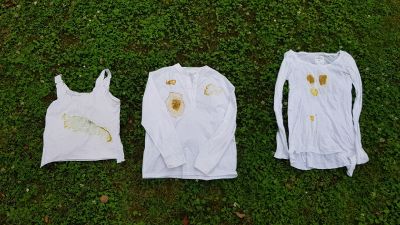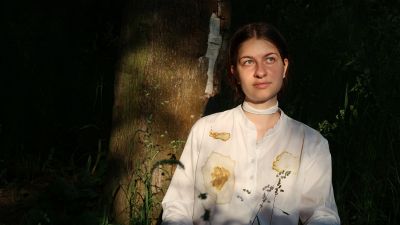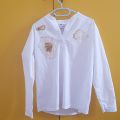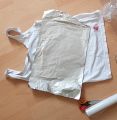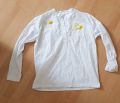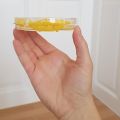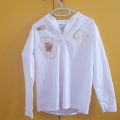INSIDE AND OUTSIDE WE ARE THE SAME
It's Physarum's world and we're just living in it
Fashion is always a statement piece. No one will ever just wear something. Clothes will always express something: a lifestyle, an occupation, a state of mind. When a human chooses to wear clothes that have dormant slime mold on it, when a human has an organism living on its clothes, what does that say about the human? Is it disgusting? Is it to not feel alone? Would a human rather have the slime grow on its skin and the clothes are just the next possible option? The collection of clothing “Inside and outside we are the same” is not part of the fast fashion world. Neither is it part of the sustainable fashion world, which claims to be connected to nature. It is a different world: Physarum Polycephalum’s world. This world is usually deep in a forest, on rotten wood, slimy and smelling. When wearing Physarum Polycephalum clothes humans might become a part of this world. Humans are sharing their bodies with a living organism. Humans are connected to nature, and disconnected from the fast fashion world, humans are post-sustainable, environmentally conscious, but in a disgusting way.
Wearing Physarum Polycephalum clothes is nothing that should be done frivolously. After all it is a dormant - but living - organism on your clothes. While wearing Physarum Polycephalum clothes human will never be alone. Human will be accompanied by a single-cell slime mold. On the other hand, humans can never rely on Physarum Polycephalum to be suitable for a clothing piece: will it grow into the right direction? On the right foil? Will it keep growing or should it be applied onto the fabric immediately? It is alive and has its own will. Growing fast, slow or not at all. With the Physarum Polycephalum the clothes it lives on have cycles too. The Physarum Polycephalum can be removed and be regrown in a petri-dish. In the meantime the clothes can be washed. Then the organism can be reapplied onto the clothes. And every time this happens a new and unique clothing piece will be created, which is growing and changing with the slime mold.
(Photos: David Lê)
Wearing clothes is always connected to a certain state of mind, and when wearing my Physarum clothes you should keep the following concepts in mind:
we are connected to nature, but in a disgusting way; kate moss said: "nothing tastes as good as skinny feels" but i say: "nothing feels as good as mold tastes"; walking until your feet bleed, but you will go insane if you don't do it; i share my breakfast of oatflakes with the slime mold that is growing in my room; post-sustainability, i will pick up my clothes from the streets and smear slime mold onto them; like Physarum we live in cycles; my clothes change and eventually will be destroed with me; we have bled through so many fabrics; biting into an apple and realizing it is full of maggots is like putting on clothes and realizing they started to mold, but this time we keep wearing them, we become a part of Physarum's world, we're not an important part in Physarum's world anymore, we're just living in it.
finished pieces
Impressions of the process:
How to create Physarum clothes:
Take a look at my Experiments to see how i learnt how to grow Physarum Poloycephalum.
I grow Physarum in a stable environment: a petri-dish and Agar Agar as a medium. To make the Physarum grow, I feed it with oat flakes once every day. After four to five days the Physarum will start growing out of the petri-dish. Or not - it is a living organism after all with its own moods and sometimes strange behaviours. After spilling out of the petri-dish it continues growing on plastic foil that i layed under the petri-dish. Or it dries out completly. Again, it is not possible to foresee exactly how it will behave. Sometimes it can be refreshed with some drops of water and continue growing on the plastic foil. Sometimes not, the experiment has failed and I need to prepare another petri-dish with agar.
If the Physarum continues to grow on the plastic foil, I lay this foil on the clothing piece I want to create with Physarum. Under the first layer of fabric has to be some aluminium foil so the Physarum stays put on one layer of fabric and does not grow on the back of the shirt. This results in four layers:
aluminium
fabric
Physarum
Plastic foil
To press the Physarum into the clothes I used seven to nine books and a 5-kilo and a 1-kilo weight that I positioned on the plastic foil. It takes around a week to completley press the Physarum, after that it is dormant and the clothes can be stored and worn. The result looks a bit like batik.
When the Physarum did not grow on the plastic foil and only spilled out of the petri-dish I manually put the Physarum on plastic foil and pressed it on the fabric in the same way I did before. The results are very different.
The fabric looks more stained and brown. And it took a long time to completely dry it. It did not dry completly under the weights, instead I air-dryed it after 5 days under the weights.
How to wash Physarum clothes
Carefully scrape the dried Physarum off the clothing piece. Place the dried Physarum in a petri-dish with agar medium. Revive it with three to four drops of water and feed it with some oat flakes. Place it in a dark environment for optimal growth, feed it every day with oatflakes and lay a plastic foil under the petri-dish, so the Physarum can spill over onto the foil and can be reapplied on the clothing piece.
The clothing piece can be washed normally, when the Physarum is scraped off.
